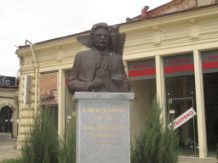

Elias Canetti’s monument was inaugurated in 2015, the 110th anniversary of the birth of famous fiction and playwright. The monument is located in the central part of Ruse and is the work of renowned sculptor, prof. Georgi Chankanov. It weighs 2 tons and a half. The writer is bent over books and an owl whispers in his ear.
Elias Canetti is a German writer, borned in Bulgaria, of sefardo-Jewish origin. He received the Nobel Prize for literature (as Austrian writer) in 1981.
Borned in Ruse, in family Jean and Mathilde Arditi Canetti, Elias is the eldest of three sons. The family can follow up in the XVth century, when the ancestors of his parents were expelled from Spain. His mother tongue is ladiniana. His father’s family moved from Ottoman Edirne in Russian. Canetti’s father and grandfather have developed a successful business in Russia. His mother belongs to one of the oldest families in Bulgaria SEFAR – Adriti, people who are among the founders of the Hebrew Russian colony from the late eighteenth century. Arditi lineage can be traced back to the XIV century, when were working as forensic specialists and astronomers at the royal court of Alfonso IV and Pedro IV. Before the Russian, they lived in Livorno in the eighteenth century.
And her childhood years spent in Ruse. His family moved (1911) in Manchester, where his father died in 1912 – according to Canetti, this happened at the news of the outbreak of the Balkan War. Canetti family moved to Lausanne, then in Vienna. Elias taught German at the time alsousing Bulgarian, English and French. Afterwards, the family moved first to Zurich (1916-1921) and thereafter (until 1924) – Frankfurt, where he finished high school. In 1924 he became a student in chemistry at the University of Vienna and graduated with a doctorate in 1929.
In 1934, Canetti was married to writer Veza (Venetian) Taubner-Calderon (Veza [Venetian] Taubner-Calderon, 1897-1963), who became his muse and literary means.
After the annexation of Austria to Nazi Germany in 1938 and the start of the persecution of Jews, Canetti went to Paris and London and was established in England. There was a long romantically link with Austrian artist Marie-Louise von Motesiczky and the Irish poet Iris Murdoch. After his wife died, he was married to Hera Busch, with whom he had a daughter, Johanna (1972), a musician.
Despite the fact that he was a German author, Canetti remained in the UK (receiving citizenship in 1952) to the 70s. The last 20 next year of his life he spent mostly in Zurich, where he wrote his autobiography (his first tome is titled “Language saved”). On 14 August 1994 Elias Canetti died in Zurich, leaving behind an important work, translated into more than 25 languages.
In 1981, Elias Canetti received the Nobel Prize for Literature for the entire work, characterized by vision, wealth, ideological and artistic power. Known are its words: “Everything I experienced later, it was already happened in Ruschuk”. At a ceremony in Stockholm, he said: “Today, after the events of Hiroshima, everyone knows what war is, and just that everyone knows, represents our only hope.”
In the honor of the writer, his birth town of Ruse, founded in 2005 the National Prize for Literature “Elias Canetti”.
